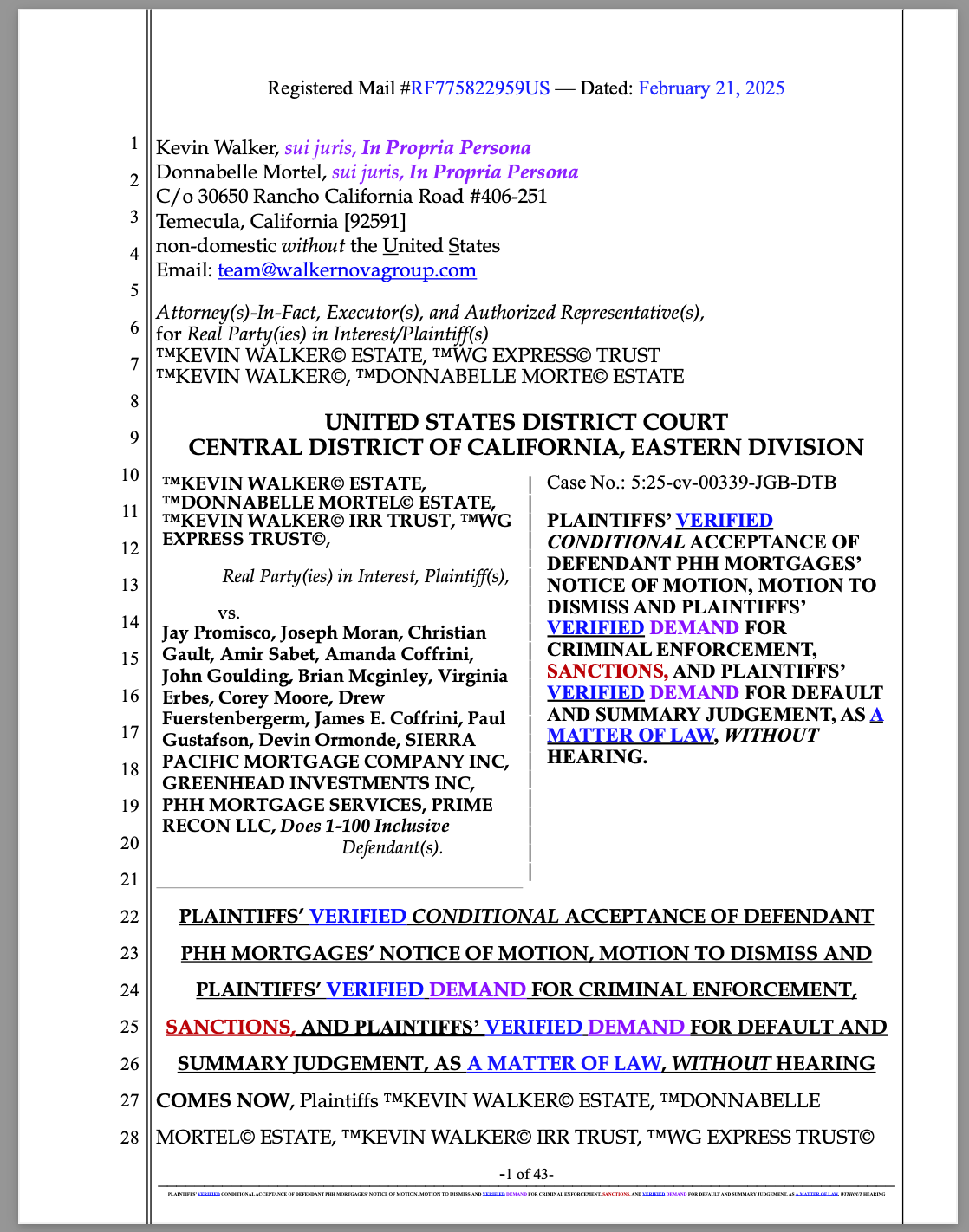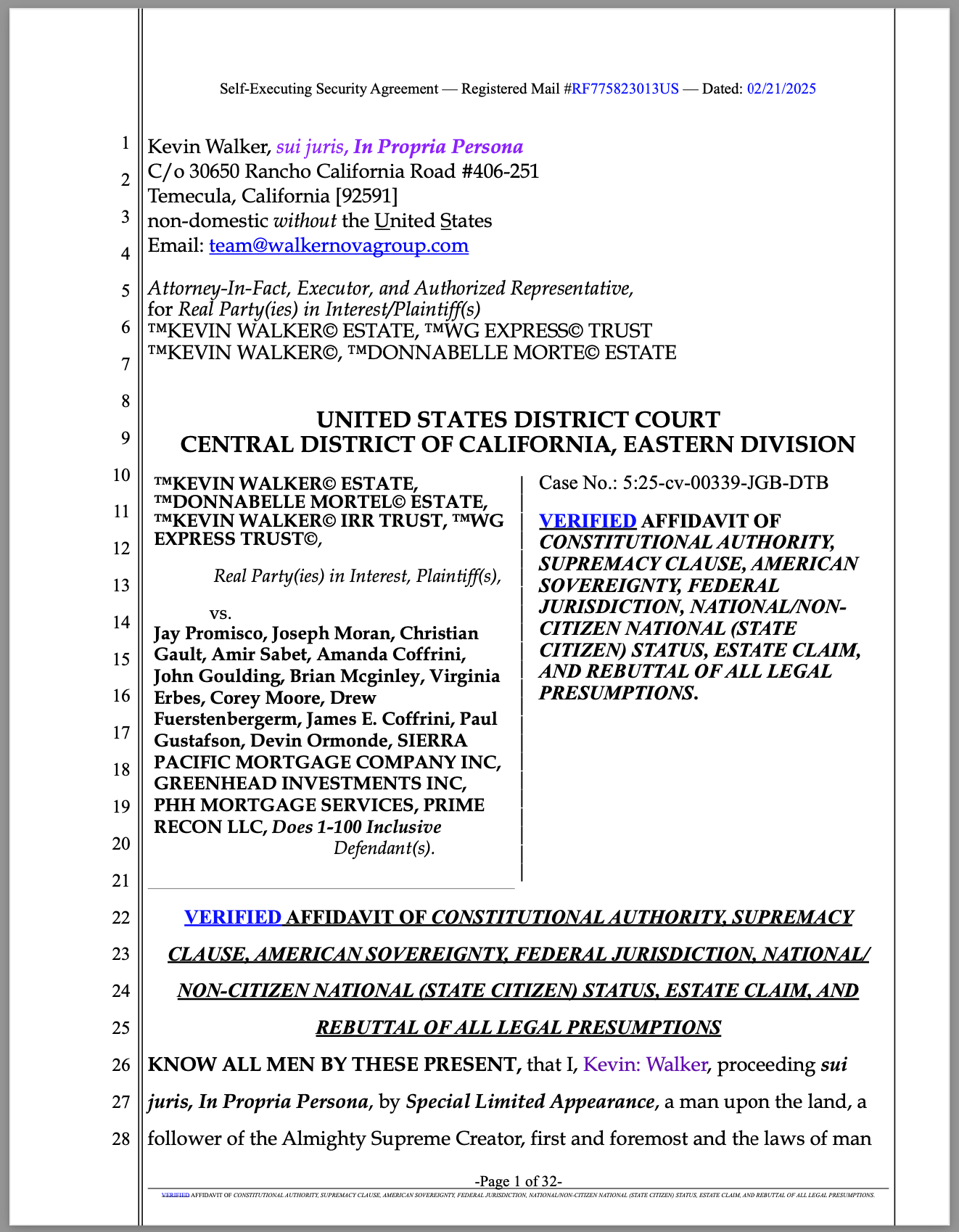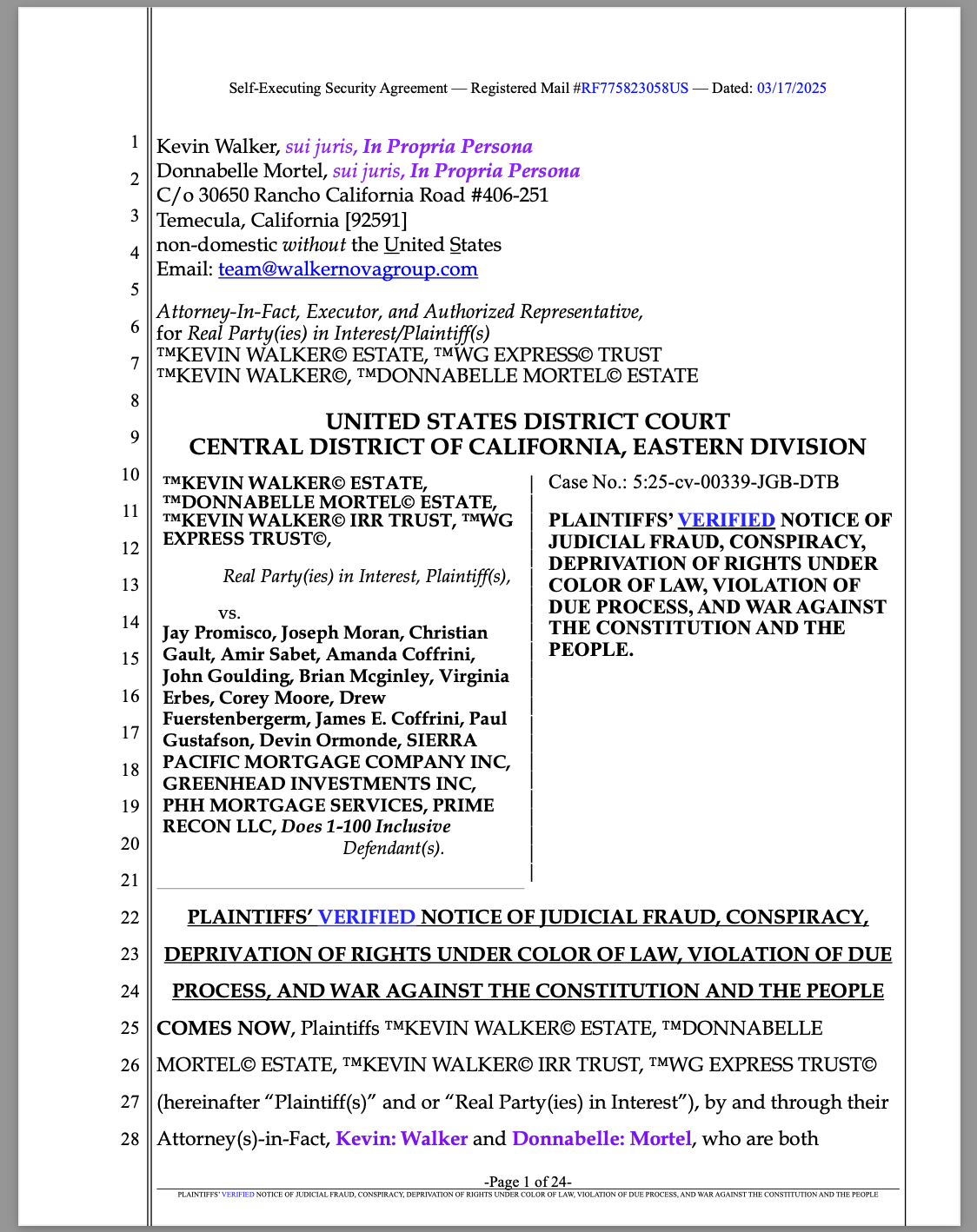
Confirmed Judicial Fraud and Conspiracy: Judge Jesus G. Bernal Conceals Affidavit, Notice, and Conditional Acceptance, and Dismisses Case In Chambers Under Color of Law
In the matter of Kevin Walker Estate et al v. Jay Promisco et al (Case No. 5:25-cv-00339, Central District of California), presiding Judge Jesus G. Bernal took extraordinary and unlawful steps to privately dismiss a constitutionally grounded case without hearing, without record, and—most gravely—without acknowledging or docketing three verified, notarized, and critical filings.
This was not a clerical oversight. This was a calculated act of judicial fraud, record tampering, and a color of law deprivation of rights in violation of both constitutional principles and federal statutes.
Three Key Documents Omitted from the Docket
The Plaintiffs had submitted the following verified filings, which were:
-
Lawfully formatted
-
Notarized and sworn under penalty of perjury
-
Submitted via proper channels
-
Never acknowledged, entered into the docket, or addressed by the court
1. VERIFIED Affidavit of Constitutional Authority, Supremacy Clause, American Sovereignty, Federal Jurisdiction, National/Non-Citizen National (State Citizen) Status, Estate Claim, and Rebuttal of All Legal Presumptions
This affidavit lawfully rebutted all presumptions of statutory jurisdiction, clarified the Plaintiffs’ status as American Nationals and State Citizens—not 14th Amendment federal citizens—and invoked authority under the Supremacy Clause (Art. VI), Title 8, and other federal jurisdictional limits.
2. PLAINTIFFS’ VERIFIED CONDITIONAL ACCEPTANCE OF DEFENDANT PHH MORTGAGE’S NOTICE OF MOTION, MOTION TO DISMISS AND PLAINTIFFS’ VERIFIED DEMAND FOR CRIMINAL ENFORCEMENT, SANCTIONS, AND PLAINTIFFS’ VERIFIED DEMAND FOR DEFAULT AND SUMMARY JUDGEMENT, AS A MATTER OF LAW, WITHOUT HEARING
This filing conditionally accepted Defendant’s motion under the law of contracts and demanded relief due to the Defendant’s failure to provide material rebuttals to the Plaintiffs’ verified claims. It included demands for sanctions, default, and summary judgment pursuant to unrebutted affidavits and Rule 56.
3. PLAINTIFFS’ VERIFIED NOTICE OF JUDICIAL FRAUD, CONSPIRACY, DEPRIVATION OF RIGHTS UNDER COLOR OF LAW, VIOLATION OF DUE PROCESS, AND WAR AGAINST THE CONSTITUTION AND THE PEOPLE
This was a direct notice to the court and record of alleged acts of misconduct, fraud, and conspiracy, including the failure to address previously submitted material, evidence of color of law activity, and a judicial war on constitutional process and trust-based claims.
All three (3) documents were unconstitutionally and criminally concealed from the public record.






A Dismissal “In Chambers” to Evade Accountability
Instead of responding to the record or hearing argument on March 31 as calendared, Judge Bernal issued a dismissal “in chambers,” evading public scrutiny, procedural transparency, and constitutional duty.
This secretive and unilateral dismissal:
-
Violated Article III (open and impartial courts)
-
Denied Plaintiffs their First, Fifth, and Fourteenth Amendment rights
-
Nullified all unrebutted, affidavit-based claims in commerce, trust law, and constitutional jurisdiction
-
Erased Plaintiff standing by falsely labeling them as “pro se,” despite their pro per appearance in trust and estate capacity
Worse, Bernal paradoxically claimed the Plaintiffs could not represent themselves at all, even while calling them “pro se.” This is a constitutional impossibility.
The Consequences of Judicial Concealment and Denial of Due Process
Judge Bernal’s actions have legal consequences far beyond mere procedural error. They constitute:
-
Fraud upon the court – Hazel-Atlas Glass Co. v. Hartford-Empire Co., 322 U.S. 238
-
Void judgment – Valley v. Northern Fire & Marine Ins. Co., 254 U.S. 348
-
Obstruction of justice – 18 U.S.C. § 1505, § 1512
-
Conspiracy against rights – 18 U.S.C. § 241
-
Deprivation under color of law – 18 U.S.C. § 242
-
Tampering with public record – 18 U.S.C. § 2071
When a federal judge conceals filings, issues rulings without record, and denies fundamental access to redress and remedy, that judge is not exercising discretion—he is engaging in unauthorized acts of administrative tyranny, and acting ultra vires (outside lawful authority).
Misuse of Judicial Power to Deny National, Trust, and Constitutional Standing
The Plaintiffs appeared as:
-
A lawfully established estate and private express trust
-
In verified non-U.S. citizen, American National capacity
-
Exercising their right to self-representation pro per, not pro se
Federal courts are required to recognize the right of individuals and trustees to represent their own property, trust estate, or national interest—especially where no commercial contract or agency relationship with the state has been formed.
“The right of self-representation is protected by the Constitution.” – Faretta v. California, 422 U.S. 806
Judicial Rebellion Against Monetary Policy and the Supremacy Clause
Judge Bernal’s dismissal implied that:
-
The Plaintiffs’ reliance on 12 U.S.C. § 411, HJR-192, and the UCC was “unintelligible”
-
All constitutional, commercial, and equity-based remedy was void
-
Private trusts and American Nationals had no lawful access to the court
This amounts to judicial nullification of U.S. law, the Supremacy Clause, and the rights secured under full faith and credit. Such a denial is not legal error—it is a constitutional breach.
Remedy and Legal Recourse
Plaintiffs now have standing and cause to pursue:
-
A Motion OR Demand to Vacate Judgment under FRCP 60(b)(4) and (3)
-
Notice of Appeal to the Ninth Circuit
-
Judicial Misconduct Complaint to the Ninth Circuit Judicial Council
-
Civil Rights Action under 42 U.S.C. § 1983 or Bivens v. Six Unknown Agents
-
Commercial Affidavit of Dishonor and Default Judgment in the public record
-
Referral to the DOJ Civil Rights Division and House Judiciary Committee
Final Summary: A Court Without a Constitution Is No Court at All
When a federal judge:
-
Conceals verified affidavits
-
Ignores all trust and estate law
-
Denies national status and pro per standing
-
Rejects monetary policy and full faith and credit
-
Issues a private, silent dismissal off the record
… they are no longer administering justice. They are engaging in a private war against the Constitution.
“Fraud vitiates everything it touches.” – U.S. v. Throckmorton, 98 U.S. 61
“A void judgment is not entitled to the respect accorded a valid adjudication.” – Valley v. Northern Fire & Marine
“Where rights secured by the Constitution are involved, there can be no rulemaking which would abrogate them.” – Miranda v. Arizona, 384 U.S. 436
In the federal civil case Kevin Walker Estate et al v. Jay Promisco et al, Case No. 5:25-cv-00339 (U.S. District Court, Central District of California), presiding Judge Jesus G. Bernal issued an off-the-record, “in chambers” dismissal of a case grounded in verified affidavits, trust law, monetary policy, and constitutional standing.
Rather than hold the scheduled hearing or address the well-formed record before him, Judge Bernal engaged in what appears to be judicial fraud, concealment of filings, and denial of due process under color of law. The order falsely labeled Plaintiffs as “pro se” while simultaneously claiming that one cannot represent oneself pro se, despite the Plaintiffs appearing in verified pro per capacity, as required by law when asserting estate, trust, or national standing.









